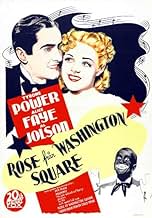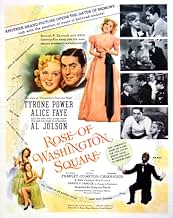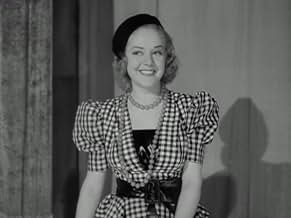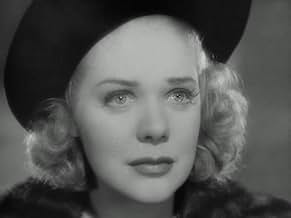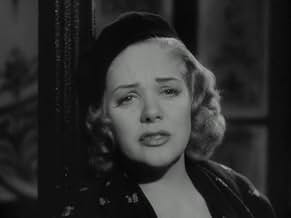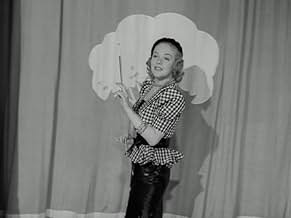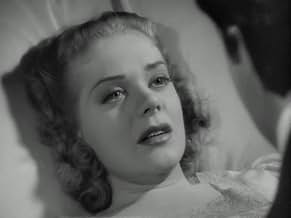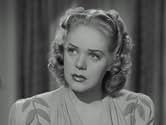AVALIAÇÃO DA IMDb
6,7/10
684
SUA AVALIAÇÃO
Adicionar um enredo no seu idiomaA singer becomes a star in the Ziegfeld Follies, but her marriage to a con man has a bad effect on her career.A singer becomes a star in the Ziegfeld Follies, but her marriage to a con man has a bad effect on her career.A singer becomes a star in the Ziegfeld Follies, but her marriage to a con man has a bad effect on her career.
- Direção
- Roteiristas
- Artistas
- Prêmios
- 2 vitórias no total
Paul E. Burns
- Chump
- (as Paul Burns)
Horace McMahon
- Irving
- (as Horace MacMahon)
- Direção
- Roteiristas
- Elenco e equipe completos
- Produção, bilheteria e muito mais no IMDbPro
Avaliações em destaque
The history of the cinema is filled with great movies; but more than that, there are special `moments,' from the great and even the not-so-great films that thanks to the magic of the movies have been preserved for all time, and now thanks to video and DVD are readily accessible for the viewing pleasure of audiences in living rooms everywhere. These movies are treasures to be cherished and savored, because they're not simply entertainment, but time capsules in which history has in some cases been inadvertently gathered and stored for posterity. And one of the jewels in this vast treasure chest that is the cinema is `Rose of Washington Square,' a 1939 picture from 20th Century Fox, filmed in glorious B&W, directed by Gregory Ratoff and starring Tyrone Power, Alice Faye and Al Jolson.
Power is Bart Clinton, a charismatic petty thief and con man whose charm and good looks keeps him one step ahead of the law as he moves from one scam to another. He's not such a bad guy, but more like a salesman without a product who utilizes his natural abilities to put a buck in his pocket. Faye is Rose Sargent, a struggling vaudeville singer, teamed up with Ted Cotter (Jolson), who together have hopes and dreams of making it to the big time. But worlds collide when Bart and Rose meet and fall in love. Ted sees Bart for what he is, but his advice to Rose falls on deaf ears, blinded as she is by her unconditional love for a man who stands in the way of not only her success as an artist, but her happiness, as well. And in the grandest tradition of Hollywood, their story plays out amid the excitement of that most famous of all avenues of aspirations, Broadway, and that town of towns, New York.
It's a good story, but with a plot that's far from unique, which in the grand scheme of things doesn't make any difference. This is solid and involving entertainment that affords the viewer the opportunity of seeing three bona fide stars together, and all doing what they do best. And just seeing them together on the screen is a moment all it's own; Power, Faye and Jolson, captured forever and immortalized through the magic of the motion picture. And at the time, who knew? To Darryl F. Zanuck this was no doubt just another picture that hopefully would produce a profitable bottom line for the studio. Did any of them have any idea what this would mean to audiences sixty years later, or what kind of legacy they were creating for future generations?
One of the best looking actors ever to grace the silver screen, Tyrone Power had a dominating presence and commanded attention in any role he played, from light, romantic fare like `Thin Ice,' to bringing the anti-hero, `Jesse James,' to life or the swashbuckling title character in `The Mark of Zorro.' He could play a heel like Bart Clinton and make him believable, or a guy soul searching for something better, as he did in `The Razor's Edge.' And if there's any doubt as to how good an actor Power was, one only has to look as far as his performance in `Nightmare Alley' to realize that he was so much more than just another pretty face. He was the man women wanted and the one other men envied because he seemed to have it all. He did; and it showed in every character he ever created for the screen.
Power, however, did not corner the market on talent and charisma in this film, but was matched every step of the way by his absolutely beguiling co-star, Alice Faye. Beautiful and gifted, Faye could sing and interpret a song in a way that was nothing less than transporting. Her vocal expressions and the emotion that dances in her eyes and plays across her face while she sings created a number of those special moments in a number of films. In this one, when she sings the heart-felt `My Man' while an incognito Power (Bart's on the lam at this point) sits huddled in the audience at the back of the auditorium, it'll grab you by the throat and send chills down your spine. And that is truly one of those memorable `Moments' that have made movies such an everlasting part of our lives and culture. When Faye turns those eyes of hers, fraught with emotion, to the camera as she sings, it's mesmerizing-- a moment that will hold you transfixed and sweep you away to another time and another place.
Which is exactly what happens when Al Jolson takes the spotlight as Ted Cotter. Jolson was perhaps the entertainer of his time, a man who entertained millions from the footlights of the most famous stages around the world. And what a treasure it is to have even part of his act preserved here on film. Some of the songs he made famous, like `Rock-a-bye-Your-Baby With A Dixie Melody,' and the one that became his trademark, `Mammy,' are seamlessly integrated into this story. Although this kind of entertainment may not be readily embraced by younger viewers-- those raised on hard rock and grunge, for example-- there is a magic in Jolson and his songs that defines an era, and with his unique voice and magnetic personality, it is riveting to watch him now in this film.
The supporting cast includes William Frawley (Harry), Joyce Compton (Peggy), Hobart Cavanaugh (Whitey), Louis Prima (Bandleader), Horace McMahon (Irving) and Moroni Olsen (Buck). It may not be the greatest musical-- or movie-- ever made, but nevertheless, `Rose of Washington Square' is a treasure, for all the reasons discussed here and more. It's a film that will be enjoyed and appreciated on any number of different levels by anyone who watches it; pure entertainment, with a particular magic all it's own. This one's a keeper. It's the magic of the movies. I rate this one 9/10.
Power is Bart Clinton, a charismatic petty thief and con man whose charm and good looks keeps him one step ahead of the law as he moves from one scam to another. He's not such a bad guy, but more like a salesman without a product who utilizes his natural abilities to put a buck in his pocket. Faye is Rose Sargent, a struggling vaudeville singer, teamed up with Ted Cotter (Jolson), who together have hopes and dreams of making it to the big time. But worlds collide when Bart and Rose meet and fall in love. Ted sees Bart for what he is, but his advice to Rose falls on deaf ears, blinded as she is by her unconditional love for a man who stands in the way of not only her success as an artist, but her happiness, as well. And in the grandest tradition of Hollywood, their story plays out amid the excitement of that most famous of all avenues of aspirations, Broadway, and that town of towns, New York.
It's a good story, but with a plot that's far from unique, which in the grand scheme of things doesn't make any difference. This is solid and involving entertainment that affords the viewer the opportunity of seeing three bona fide stars together, and all doing what they do best. And just seeing them together on the screen is a moment all it's own; Power, Faye and Jolson, captured forever and immortalized through the magic of the motion picture. And at the time, who knew? To Darryl F. Zanuck this was no doubt just another picture that hopefully would produce a profitable bottom line for the studio. Did any of them have any idea what this would mean to audiences sixty years later, or what kind of legacy they were creating for future generations?
One of the best looking actors ever to grace the silver screen, Tyrone Power had a dominating presence and commanded attention in any role he played, from light, romantic fare like `Thin Ice,' to bringing the anti-hero, `Jesse James,' to life or the swashbuckling title character in `The Mark of Zorro.' He could play a heel like Bart Clinton and make him believable, or a guy soul searching for something better, as he did in `The Razor's Edge.' And if there's any doubt as to how good an actor Power was, one only has to look as far as his performance in `Nightmare Alley' to realize that he was so much more than just another pretty face. He was the man women wanted and the one other men envied because he seemed to have it all. He did; and it showed in every character he ever created for the screen.
Power, however, did not corner the market on talent and charisma in this film, but was matched every step of the way by his absolutely beguiling co-star, Alice Faye. Beautiful and gifted, Faye could sing and interpret a song in a way that was nothing less than transporting. Her vocal expressions and the emotion that dances in her eyes and plays across her face while she sings created a number of those special moments in a number of films. In this one, when she sings the heart-felt `My Man' while an incognito Power (Bart's on the lam at this point) sits huddled in the audience at the back of the auditorium, it'll grab you by the throat and send chills down your spine. And that is truly one of those memorable `Moments' that have made movies such an everlasting part of our lives and culture. When Faye turns those eyes of hers, fraught with emotion, to the camera as she sings, it's mesmerizing-- a moment that will hold you transfixed and sweep you away to another time and another place.
Which is exactly what happens when Al Jolson takes the spotlight as Ted Cotter. Jolson was perhaps the entertainer of his time, a man who entertained millions from the footlights of the most famous stages around the world. And what a treasure it is to have even part of his act preserved here on film. Some of the songs he made famous, like `Rock-a-bye-Your-Baby With A Dixie Melody,' and the one that became his trademark, `Mammy,' are seamlessly integrated into this story. Although this kind of entertainment may not be readily embraced by younger viewers-- those raised on hard rock and grunge, for example-- there is a magic in Jolson and his songs that defines an era, and with his unique voice and magnetic personality, it is riveting to watch him now in this film.
The supporting cast includes William Frawley (Harry), Joyce Compton (Peggy), Hobart Cavanaugh (Whitey), Louis Prima (Bandleader), Horace McMahon (Irving) and Moroni Olsen (Buck). It may not be the greatest musical-- or movie-- ever made, but nevertheless, `Rose of Washington Square' is a treasure, for all the reasons discussed here and more. It's a film that will be enjoyed and appreciated on any number of different levels by anyone who watches it; pure entertainment, with a particular magic all it's own. This one's a keeper. It's the magic of the movies. I rate this one 9/10.
This is an excellent movie musical from the 20th Fox studio, which made excellent movie musicals. Fox made all those great musicals with John Payne and Alice Faye, until she got supplanted by Betty Grable. It's all here - storyline, music, production values and a Who's-Who cast of memorable character actors from the Golden Age of Hollywood.
"Rose" is actually a revue with only one or two songs written for the movie; "I Never Knew Heaven Could Speak" is one and is the best song in the picture. The rest are songs from pre and post WW1 and are old standards - there are 20 songs in all. Then there is the Cigarette Dance which contains some trick photography and is very clever indeed.
It stars Tyrone Power and Alice Faye who handle acting chores, but the singing duties belong to Al Jolson, who at one time was considered the best entertainer of the 20th century on either coast. He comes alive when he sings his signature numbers but has a very limited acting range. This picture is seldom seen today because, for reasons rooted in the early part of the last century, Jolson sang in blackface. Apparently this worked for him but the film is no longer in the good graces of the PC crowd and those intimidated by them. The plot is based (loosely) on Fanny Brice and her husband/problem child Nicky Arnstein. As we know too well, Hollywood feels fiction is stranger than truth and punches up many stories that were good to begin with. Plus, they were true, and what fun is that.
Do yourself a favor; if you can find this picture watch it and see how Hollywood used to do it in the good old days. As I stated in the summary, that's entertainment in the purest sense of the term. I gave it a well-deserved rating of 8.
"Rose" is actually a revue with only one or two songs written for the movie; "I Never Knew Heaven Could Speak" is one and is the best song in the picture. The rest are songs from pre and post WW1 and are old standards - there are 20 songs in all. Then there is the Cigarette Dance which contains some trick photography and is very clever indeed.
It stars Tyrone Power and Alice Faye who handle acting chores, but the singing duties belong to Al Jolson, who at one time was considered the best entertainer of the 20th century on either coast. He comes alive when he sings his signature numbers but has a very limited acting range. This picture is seldom seen today because, for reasons rooted in the early part of the last century, Jolson sang in blackface. Apparently this worked for him but the film is no longer in the good graces of the PC crowd and those intimidated by them. The plot is based (loosely) on Fanny Brice and her husband/problem child Nicky Arnstein. As we know too well, Hollywood feels fiction is stranger than truth and punches up many stories that were good to begin with. Plus, they were true, and what fun is that.
Do yourself a favor; if you can find this picture watch it and see how Hollywood used to do it in the good old days. As I stated in the summary, that's entertainment in the purest sense of the term. I gave it a well-deserved rating of 8.
If you liked Funny Girl, and what connoisseur of musicals didn't, you'll be interested to know it wasn't the first story inspired by Fanny Brice. Rose of Washington Square is a fictional-as advertised by the disclaimer in the credits-depiction of a Ziegfeld girl who falls in love with a gambler. Sound familiar? The names are totally different, so if you weren't looking for it, you might not immediately recognize the similarity to Funny Girl. Once Alice Faye started singing "My Man," hopefully you'd figure it out.
Tyrone Power plays the scoundrel, and he and Alice have as much sizzling chemistry as they always do in their movies together. Al Jolson, who spends more of his screen time in black face than out of it, plays Alice's devoted friend. Since this was the time period without video rentals, Al pleased audiences by repeating his signature numbers "Mammy" and "California Here I Come." In the story, Al's in love with her, but since he's up against Tyrone Power, he doesn't stand a chance. It's love at first sight for Ty and Alice, and even though he's no good, albeit incredibly shrewd, she can't let him go. Barbra Streisand couldn't let Omar Sharif go, could she? Make sure to go into this movie expecting a drama.
Tyrone Power plays the scoundrel, and he and Alice have as much sizzling chemistry as they always do in their movies together. Al Jolson, who spends more of his screen time in black face than out of it, plays Alice's devoted friend. Since this was the time period without video rentals, Al pleased audiences by repeating his signature numbers "Mammy" and "California Here I Come." In the story, Al's in love with her, but since he's up against Tyrone Power, he doesn't stand a chance. It's love at first sight for Ty and Alice, and even though he's no good, albeit incredibly shrewd, she can't let him go. Barbra Streisand couldn't let Omar Sharif go, could she? Make sure to go into this movie expecting a drama.
Despite this disclaimer at the beginning of "Rose of Washington Square," Fanny Brice realized the film was about her and quickly sued 20th Century Fox.
Gee, wonder what the kicker was...the good-looking con man husband who goes to jail on a bond fraud? The lead character headlining with the Ziegfield Follies? Or was it the song "My Man"?
Alice Faye is very pretty as Rose in this somewhat politically incorrect film which also stars Tyrone Power and Al Jolson: There's the man who is paid to drink so he can heckle Al Jolson as part of his act, and there's Al himself in blackface with white lips up on stage singing.
Nevertheless, the real story concerns the codependent relationship between Rose and Bart, her crooked husband. But it's Tyrone Power, and what woman wouldn't have loved him - in fact, what woman didn't love him in 1939? He was the number 2 box office star. He portrays the likable but sleazy character very well.
In the beginning of his career a few years earlier, he did romantic comedy, then did a string of films where he was a cad, then played soldiers, and after the war, did everything - he was a young man who found himself in "The Razor's Edge," played against type in "Nightmare Alley," and period-pieced his way through Fox until his contract finally ended. In 22 years as a star, he really did every genre, and did them beautifully.
There's lots of music in this movie and a HUGE build-up to the song "My Man" before Faye ever sings it. When she does, it's not the Streisand version, but rather a torch song, sung in Faye's low, rich voice.
Jolson was a terrific performer though apparently extremely egomaniacal and difficult to work with. He sings his standards: "Mammy," "California Here I Come," "Toot-toot-Tootsie," "Rockabye Your Baby," etc., and he's great.
Power and Faye make a wonderful couple. And by the way, they shared the same birthday, a year apart.
This is an okay film - but it's no Alexander's Ragtime Band, which is far superior.
Gee, wonder what the kicker was...the good-looking con man husband who goes to jail on a bond fraud? The lead character headlining with the Ziegfield Follies? Or was it the song "My Man"?
Alice Faye is very pretty as Rose in this somewhat politically incorrect film which also stars Tyrone Power and Al Jolson: There's the man who is paid to drink so he can heckle Al Jolson as part of his act, and there's Al himself in blackface with white lips up on stage singing.
Nevertheless, the real story concerns the codependent relationship between Rose and Bart, her crooked husband. But it's Tyrone Power, and what woman wouldn't have loved him - in fact, what woman didn't love him in 1939? He was the number 2 box office star. He portrays the likable but sleazy character very well.
In the beginning of his career a few years earlier, he did romantic comedy, then did a string of films where he was a cad, then played soldiers, and after the war, did everything - he was a young man who found himself in "The Razor's Edge," played against type in "Nightmare Alley," and period-pieced his way through Fox until his contract finally ended. In 22 years as a star, he really did every genre, and did them beautifully.
There's lots of music in this movie and a HUGE build-up to the song "My Man" before Faye ever sings it. When she does, it's not the Streisand version, but rather a torch song, sung in Faye's low, rich voice.
Jolson was a terrific performer though apparently extremely egomaniacal and difficult to work with. He sings his standards: "Mammy," "California Here I Come," "Toot-toot-Tootsie," "Rockabye Your Baby," etc., and he's great.
Power and Faye make a wonderful couple. And by the way, they shared the same birthday, a year apart.
This is an okay film - but it's no Alexander's Ragtime Band, which is far superior.
In this early version of the Funny Girl story, Alice Faye as Rose Sargent simply shines in her performance. Alice's warm contralto voice was one of the easiest to take of any musical star from the Thirties. She's helped her by a collection of post World War I standards and a new song written by the 20th Century Fox songwriting team of Mack Gordon and Harry Revel, I Never Knew Heaven Could Speak.
Other than the names were changed to make them ethnically neutral, Alice, as Fanny Brice, sings a lot of ballads in her own style. Fanny Brice as a performer was nothing if not ethnic. Other than her famous standard My Man, in which Faye reprises her well, Brice's repertoire consisted of comedy numbers mostly with an accent to identify her Lower East Side of New York Jewish origins.
Still Alice in her goyish version of Fanny was real enough so that Fanny sued 20th Century Fox to stop the film. She and Darryl Zanuck reached an out of court settlement.
Tyrone Power is Hobart DeWitt Clinton(Nicky Arnstein), a name certainly waspy enough to disguise any ethnicity. It's Ty's third and final film with Alice Faye. Whether played by Power or Omar Sharif, the husband's role is a tricky one. He's a charming con man and you can't make him to weak or the audience will never understand why Faye is even bothering with him. Of course if you have the looks of Tyrone Power, it's easy. But you do have to have the talent to match which Power does. In the storyline at the beginning, Power is identified as having served in the American Expeditionary Force in France in World War I. Deliberately put there to make the audience empathetic with him. After all in 1939 there were certainly a lot of moviegoers who were veterans or in the families of World War I veterans.
Al Jolson was here and shares the spotlight with Faye in singing some of his old standards from that period. He was very good in his part as Faye's confidante and fellow performer. But Jolson with his ego did not like sharing the spotlight with anyone. His three 20th Century Fox roles were supporting or guest star roles and he hated it. Equally I might add that Alice Faye couldn't stand him.
Irony of ironies, back in the day Jolson himself got into a famous feud with Walter Winchell who was the creative genius behind Broadway Through a Keyhole. That film was a disguised version of his own courtship and marriage to Ruby Keeler and Jolson was the one doing the suing then.
Alice Faye is not Fanny Brice in the film, but I'm happy with her just being Alice Faye.
Other than the names were changed to make them ethnically neutral, Alice, as Fanny Brice, sings a lot of ballads in her own style. Fanny Brice as a performer was nothing if not ethnic. Other than her famous standard My Man, in which Faye reprises her well, Brice's repertoire consisted of comedy numbers mostly with an accent to identify her Lower East Side of New York Jewish origins.
Still Alice in her goyish version of Fanny was real enough so that Fanny sued 20th Century Fox to stop the film. She and Darryl Zanuck reached an out of court settlement.
Tyrone Power is Hobart DeWitt Clinton(Nicky Arnstein), a name certainly waspy enough to disguise any ethnicity. It's Ty's third and final film with Alice Faye. Whether played by Power or Omar Sharif, the husband's role is a tricky one. He's a charming con man and you can't make him to weak or the audience will never understand why Faye is even bothering with him. Of course if you have the looks of Tyrone Power, it's easy. But you do have to have the talent to match which Power does. In the storyline at the beginning, Power is identified as having served in the American Expeditionary Force in France in World War I. Deliberately put there to make the audience empathetic with him. After all in 1939 there were certainly a lot of moviegoers who were veterans or in the families of World War I veterans.
Al Jolson was here and shares the spotlight with Faye in singing some of his old standards from that period. He was very good in his part as Faye's confidante and fellow performer. But Jolson with his ego did not like sharing the spotlight with anyone. His three 20th Century Fox roles were supporting or guest star roles and he hated it. Equally I might add that Alice Faye couldn't stand him.
Irony of ironies, back in the day Jolson himself got into a famous feud with Walter Winchell who was the creative genius behind Broadway Through a Keyhole. That film was a disguised version of his own courtship and marriage to Ruby Keeler and Jolson was the one doing the suing then.
Alice Faye is not Fanny Brice in the film, but I'm happy with her just being Alice Faye.
Você sabia?
- CuriosidadesThis film closely resembles the life of entertainer Fanny Brice, and Alice Faye even sings Brice's signature song, "My Man" in the film. According to Alice Faye: The Star Next Door (1996), Brice and her second husband, Nicky Arnstein, sued 20th Century Fox for $750,000. The studio benefited from the publicity generated by the lawsuit - the film became the highest grossing musical of 1939 - and eventually settled out of court with both: Arnstein accepted $25,000, while Brice demanded considerably more and agreed to an undisclosed amount.
- Citações
Barton Dewitt Clinton: You know, I wish you were in some kind of trouble.
Rose Sargent: But why?
Barton Dewitt Clinton: Just so that I could get you out of it.
- Versões alternativasThey cut out Alice Faye singing "Chasing Rainbows" from the film, but it is on the DVD.
- ConexõesFeatured in Calouros de Sorte (1944)
Principais escolhas
Faça login para avaliar e ver a lista de recomendações personalizadas
Detalhes
- Tempo de duração
- 1 h 26 min(86 min)
- Cor
- Proporção
- 1.37 : 1
Contribua para esta página
Sugerir uma alteração ou adicionar conteúdo ausente

